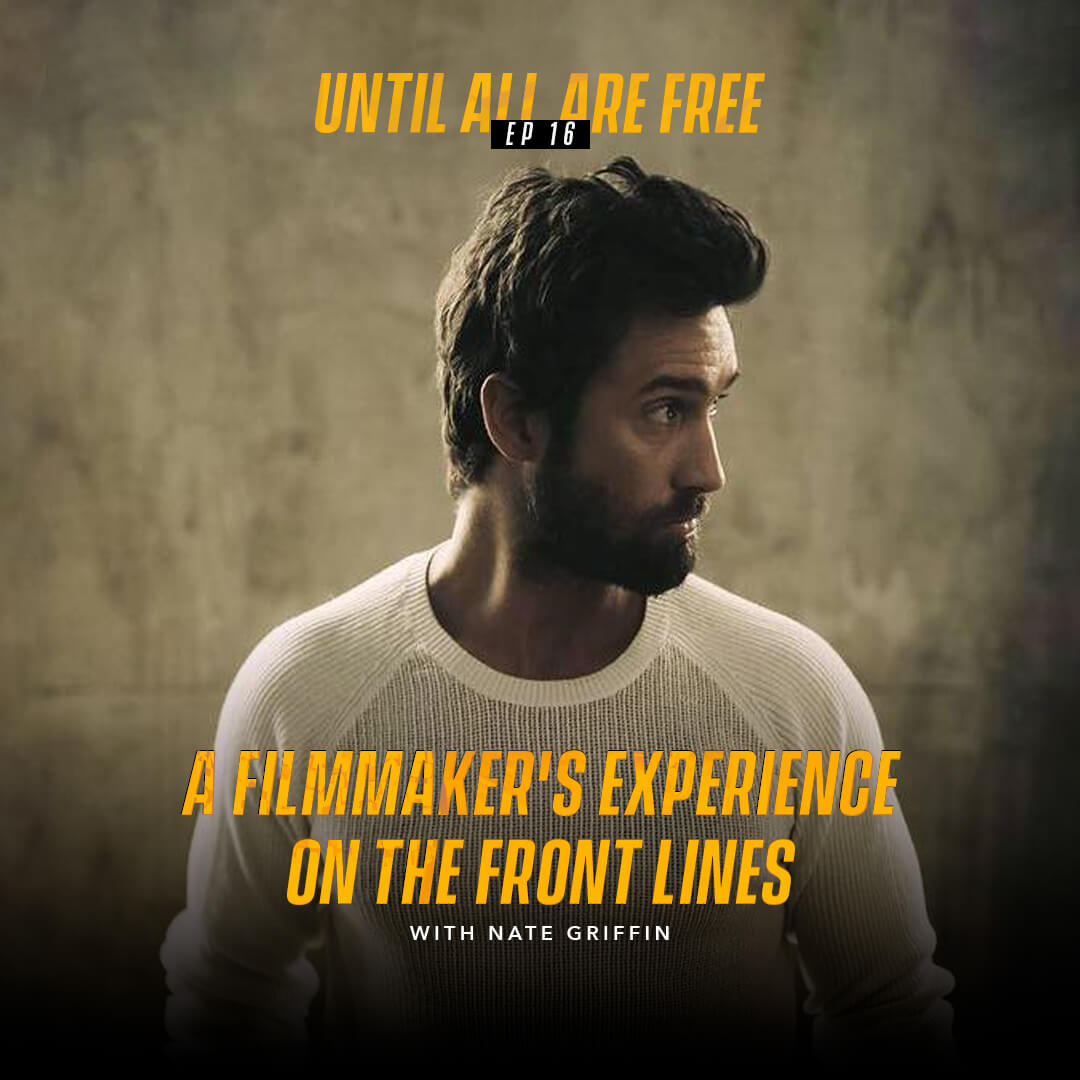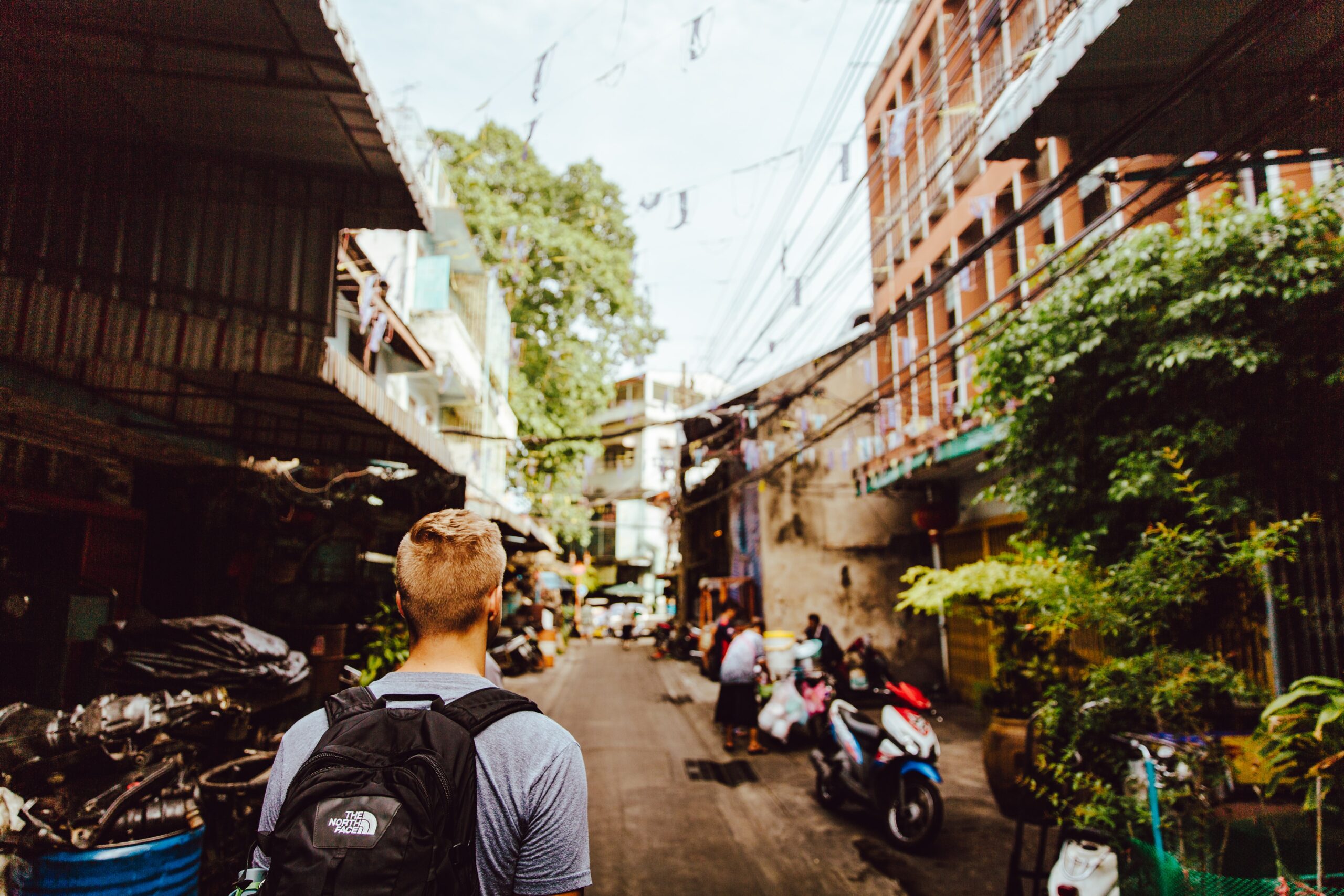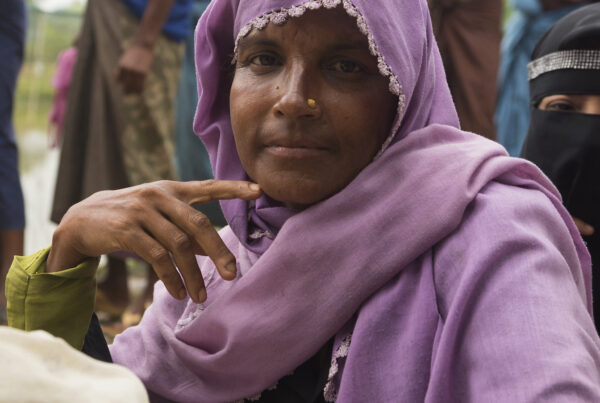
This episode Preston is joined by DELTA* operative and TER board member, Nate Griffin. Nate is an Executive Producer working within the film industry. His company, Grateful Inconvenience Inc., most recently produced the television series, Connected: A Search for Unity. The series features Monty Moran, former CEO of Chipotle Mexican Grill, as he travels across the U.S. and Canada talking with people about their unique perspectives on life, culture, the environment, politics, immigration and social media.
You can follow Nate’s work on Instagram at @kanakanate.
*The Exodus Road primarily supports police in evidence gathering for cases of human trafficking. Working with teams of nationals, we deploy trained and highly vetted Western operatives to help with identifying current victims, gathering intelligence, building evidence packages for police, and supporting operations. We call this team DELTA Team.
While the process and work is challenging and daunting, it is also highly effective. Evidence is gathered, cases are delivered, rescues and arrests are empowered on the front lines.
Episode Transcript
Nate Griffin: (00:00)
Well, I had some awareness of what was going on because I had been to Pattaya. I had seen walking [inaudible 00:00:08] and so there was this peripheral knowledge and understanding of the fact that there was a thriving sex trade, but in terms of the real details and understanding of what is happening and the scale that it’s happening specific to human trafficking, and then within human trafficking specific to sexual exploitation of minors and of women, no, I had very little real factual data-driven understanding of that reality.
Preston Goff: (00:56)
This is Until All Are Free. I’m your host Preston Goff. A few months ago in the spring of 2021, Nate Griffin found himself preparing for an undercover operation with law enforcement partners and the Exodus Road field team in Latin America. I actually had the privilege to be there in that moment, not in the undercover setting, just to be clear, but alongside the team, as they were preparing to sit with suspected victims of sex trafficking. I have to say the level of expertise and professionalism in that preparation was nothing short of awe inspiring. And actually in future episodes, I’m going to be bringing you the stories of these men and women in their own words. But today I’m excited to introduce you to Nate. He’s a film producer, a photographer, a board member at the Exodus Road and a Delta operative. That means he’s on a team of volunteer operatives who are vetted and trained to support the work of our in-country national operatives around the world.
Preston Goff: (02:00)
Here’s my conversation with Nate.
Preston Goff: (02:03)
Well, Nate, I want to welcome you to the podcast today. I’ve known you at a distance in conversation with David, with Matt, with these gentlemen that we both know, and they’ve had just nothing but glowing things to say about you and not only the way that you present yourself in an undercover setting, but also just the way that you think about the work and the way that you think about the world. So I’m just excited to get to talk with you and to hear more about the work that you do and what you’re passionate about. So I wonder if you might just start by describing yourself in your own words and tell me what you do.
Nate Griffin: (02:45)
That’s a loaded question straight out the gate there, so in terms of what I do, which is the dude response to describing oneself. Yeah. I work in the film industry and so I’m a creative. I work in film and television. I came up as a production designer. So for me the visual, how something looks through the camera and ultimately on screen is what I live and breathe. And I do that. I’m involved in the business side of it as well, kind of the executive production. And just making sure that if you make a film that actually gets seen by people as well. And so yeah, that, and my creative… So I’m a creative for sure, to the core, but a lot of what I do now is business.
Nate Griffin: (03:34)
And so my creative outlet really and the thing that sort of allows me to continue to sort of scratch that creative itch is photography for me. So, seldom am I on location without a camera somewhere close to hand for me. And having come up as a painter and that being sort of my intro into production design. Just getting an image captured is something that just for me… That’s my happy place. So I would say in terms of the consistent creative outlet for me right now, it would be the photography side of things.
Preston Goff: (04:16)
Yeah. And as the creative director here at The Exodus Road, I can’t tell you how many times I’ve like looked at an image and seen in the metadata that, hey, that’s a Nate Griffin file. And it’s just been a gift to be able to work with that and to see how that passion has pushed along the work of abolition and the work of freedom. You’re also a Delta operative.
Nate Griffin: (04:39)
I am.
Preston Goff: (04:40)
So talk to me a little bit about that and what that journey looked like. How did you find yourself on that path? One thing that I noticed about anybody who does this work is it seems like there’s always this moment where there’s a bit of an awakening to the reality of the crime of human trafficking and it grips you and for people who are now down the path and they’ve committed themselves to that, that was a big shift for them. And I wonder if you’ve had the same kind of experience and what that was like.
Nate Griffin: (05:12)
I can very easily point to a moment… Oh man, I guess it was 10 years, 12 years, 10 years ago? I don’t even… It was a long time ago. It has to be close to a decade ago when I was first introduced to Matt. And I was actually in Chiang Mai on a project that had nothing to do with… The Exodus Road didn’t exist.
Preston Goff: (05:33)
Yeah. It wasn’t even a thing.
Nate Griffin: (05:34)
So it had nothing to do with that. And I was in Chiang Mai and a mutual friend of ours who is another gentleman who actually now sits on the board as well, was a part of this other project that I was doing. I was doing production design and stuff for this big conference. And he was like, man, my friend, Matt Parker is here in town. He’s doing some pretty interesting things. I’d love for you guys to meet, can he just come to your hotel room and hang out and tell you what he’s doing on?
Preston Goff: (06:01)
Yeah, sure.
Nate Griffin: (06:02)
Absolutely. Of course. And so when he came in, Matt is… He has this intensity about him. He’s very laid back and easygoing, but there’s sort of this smoldering intensity in Matt. I think that is only sort of grown as he’s really stepped into the reality of what he does. But even back then, there was this sort of fresh fire that was there. It was tangible. You could feel it. And when he started talking about the work that he was, at that time, doing absolutely solo pre-organization, pre support of any kind, it gave me, as it’s doing right now, it gave me a chill.
Nate Griffin: (06:41)
I had some awareness of what was going on because of working in Asia with other clients, I had been to Pattaya. I had seen [inaudible 00:07:00]. And so there was this peripheral knowledge and understanding of the fact that there was a thriving sex trade. Let’s put it that way. But in terms of the real details and understanding of what is happening and the scale that it’s happening, it’s specific to human trafficking. And then within human trafficking specific to sexual exploitation of minors and of women, no, I had very little real factual data-driven understanding of that reality.
Preston Goff: (07:32)
This initial moment as Nate sat across from Matt and begin to learn the details of how the exploitation of men and women, boys and girls was taking place in Thailand would lead Nate down a path towards becoming an undercover operative with the Exodus Road. Now the Exodus Road only works on cases in the undercover setting under the authority of and in collaboration with local police and only in a support based role. As investigators always operating as a team and never individually gather evidence of human trafficking exploitation, it’s often required that they enter into brothels, bars, and other spaces where sex trafficking is suspected. TER’s investigative teams utilize best practices and standard operating procedures that emphasize safety for themselves, for partners in law enforcement, and most importantly for the human trafficking victims that we work together to rescue. The Exodus Road is also highly selective in the recruitment embedding process for undercover operatives. These men and women are held to strict investigative procedures in alignment with law enforcement best practices that emphasize integrity, character, public trust, and accountability.
Nate Griffin: (08:50)
Initially decisions that I made in terms of getting involved with the organization were very much practically oriented towards how can I just be an advocate and help, but then I think it does and as Matt and the team really began to learn more and understand the necessity for the undercover aspect of what we do. And it sort of necessitated there being kind of this niche thing where in certain cases, a local, as much as to some degree that can gather information, they need an ex-pat, somebody that’s a white skin, to go in there because of the access that you can get simply because of what you look like. It just was kind of normal because it literally is what I do in my real life. I make believe worlds for a living.
Nate Griffin: (09:42)
And so this to me was one of those things where it was just sort of a natural flow into that. Initially starting with the practicality of the more that you’re tangibly involved, the better you can tell the story, the better you can advocate, the more authentically you can connect Matt and Laura, and then as the organization grew with people of means, and then it became, no, this is at every opportunity what I want to do and need to be doing, because [crosstalk 00:10:12] I can do it. Yeah. If not me, then who? And my personality suits the role of sort of stepping into that other person that you kind of have to become on the surface.
Preston Goff: (10:25)
Yeah. I want to spend some time talking about what it’s actually like to put on the hat and wear the clothes of the other person, to sit across from survivors or victims in the moment. But I want to start us actually at the tail end of the process. When I talk with people about the work of Delta operatives, so many questions arise, like how do they do it? How do they care for their mental health? How does the Exodus support operatives? And I heard recently about this practice, which is that Delta operatives that go into deployment are asked often to write letters to the victims that they encounter in the brothel and I’m just struck by how intentional that is. And as I was in conversation with David, he was telling me about a song that he wrote recently that was born out of conversation with you, but a letter written to a victim in a brothel. And I wondered if you might just tell me about that letter.
Nate Griffin: (11:26)
Yeah. So for me, again, it’s an interesting thing and when you’re trying to sort of regurgitate the story of your experience undercover, and the things that you encounter and the things that you see, it’s hard to frame that. In this case, I think all of us that do this, there are certain cases which they don’t stop at being cases, they become names and faces that we never forget. And this is one of those for me. This little girl that the operation just really came to life and that ultimately ended up being multiple interactions with this girl named… I’m not going to say her name, but this girl who her name translates to blue in English or her nickname translates to blue. Yeah.
Nate Griffin: (12:33)
And at the end of this deployments, like you mentioned, one of the practices that we do is we just take this time to sort of just in whatever format you want to do it, usually it’s some version of a letter, a journal entry, something like that, say all the things that you wish you could have said. You sort of mentally envelop that person in a hug and you say the things to them that you dramatically wish that you could say and make them believe about themselves. And to me, that’s what that letter was about and for me I have three boys. My oldest boy is going to be six soon. His favorite color is blue. And there were all of these little things just in my multiple interactions with this particular girl that just made the whole thing incredibly personal, just from a perspective of it sort of sinking into my soul and not to mention her just child likeness and factual childishness because of her age.
Nate Griffin: (13:49)
And so this I guess poem/letter sort of just came out of me, that sort of was a riff off of the significance of the color blue and it was one of those things where I just wanted her to… And she has many of these children that are victims. They come from very remote areas. They’re farmers’ children, and fishermen’s children and they’re rough around the edges. You can paint them up and put them in a uniform and a costume and you spend just a few minutes with them, especially if you understand what you’re interacting with to realize that this child is one tiny step from being in the village and she had this very ragged sort of hand done rose tattooed on her hand and there were all these little things that for me, they were these poignant little versions of what could be for her.
Nate Griffin: (15:10)
And it was just very easy to tell a story around these things that was the dream of what I dream for her, what I’m very certain she dreams for herself. And so this letter just sort of unfolded and David and I are partners undercover. We work very well together. Just sort of have a very natural rhythm and I sent it to him and I was like, I don’t know, here, read it. And this song sort of came out of it. And I’ve never actually heard the produced song actually to this day. I’ve heard the rough of it and immediately, it just sort of re-wrecked me in every way.
Preston Goff: (18:03)
It’s got to be so healing because you’ve just spent all this time, literally like your so longing to be able to say those things. And it’s a unique characteristic of our Delta operatives that we don’t reveal our cover. And I think that’s something a lot of people don’t understand. Talk a little bit about why that’s important, to stay in scene.
Nate Griffin: (18:26)
Yeah. Well, the most significant reason is if we’ve done our job right, no one ever knows that we were in any way involved with a case coming to fruition and someone getting rescued and someone getting held accountable for their actions. And so the whole point… There are many strategic reasons why our identity is never revealed in terms of being the catalyst for a case becoming a case, one being for our own protection and the protection of our victims and our law enforcement partners, but also the longevity of our ability to operate.
Nate Griffin: (19:09)
And then on top of that at the end of the day, our goal is to come in and to lift up the law enforcement who are there, who are working, and we want them to have the credit. We want this to be something that is a notch on their belt.
Nate Griffin: (19:31)
They are the ones that we want to be on the front cover of the newspaper and the news story, whatever it is, because that’s a powerful motivator for them. In many of these cultures where we work this idea of face or the image that you portray is the paramount motivator, even more than money. Money is a very close second. And so if we can remain in the position to where our actions result in them gaining face-
Preston Goff: (20:06)
Brings them honor.
Nate Griffin: (20:07)
It brings them honor. Yes. Then all that it does is strengthen our position in terms of being able to effectively build cases.
Preston Goff: (20:18)
Yeah. So all of that is mostly focused on Southeast Asian undercover work. And we are involved in Latin America. And I wonder if you could just describe maybe some of the differences culturally that require variances in the way that undercover work takes place, maybe some of the inherent dangers that don’t exist in Southeast Asian culture, that kind of thing.
Nate Griffin: (20:46)
Yeah. Well, in Latin America, almost all of the nefarious activity, the non-legal and legal trade, in almost every situation there’s going to most likely be cartel ties. You many times are going through multiple locked doors. You’re getting armed security pat downs. When you’re in, you’re in, you’re not just going to get up and run out if something goes sideways. And so when you’re going into those situations, again, in Latin America, we have to have documented audio and visual proof of a crime being committed of exploitation happening, et cetera. And so you’re very much in a position where there’s not an easy out and as an American citizen, you’re dramatically less sort of on a pedestal in Latin America than you are in some of these poor Asian countries, et cetera. And two very often the scenarios themselves it’s important to build much more of a solid believable narrative.
Nate Griffin: (22:00)
And two, one of the interesting things with Latin America as well, is that very often when we’re undercover, we’re undercover with active duty law enforcement that are task force individuals and oftentimes we’re just like, dude, relax. You look like a police officer right now. Chill. So those kinds of things. And so it’s just learning to balance those things. And again, it’s very much the reason that they’re sort of a certain personality set that I think works for this kind of work is you have to be able to adapt instantaneously to a situation and you have to be able to be super uncomfortable with no evidence of that discomfort available for the person on the other side of the conversation or in the setting.
Nate Griffin: (22:54)
And I don’t know that that’s necessarily learned, I think you either have it or you don’t. And yeah.
Preston Goff: (23:05)
Yeah. Well, let’s end where we started and let’s come back to just… In the podcast world, there’s a lot of us that are creatives, artists, people who are passionate about changing the world and making it a better place. And I’m just curious to know, for you as a creative, as an artist, where do you see artists having a role in the midst of the anti-trafficking movement? What’s our responsibility to it? And yeah, I’m kind of curious to know just what creative endeavors maybe you have bouncing around in your head that you’re passionate about and really want to see come to fruition?
Nate Griffin: (23:46)
Yeah. I think there’s a lot of different ways. First of all, in my opinion, if you’ve been given a platform of any kind, we have a moral obligation to utilize our platform for the betterment of humanity period. Let’s take religion, let’s take faith, let’s take God out of the conversation. We have an obligation as creatives, as storytellers, as influencers to not only portray the human story, but to help, to alter the human story in areas where there are tremendous fractures. I think it’s our obligation to do that, to speak the truth about what is going on about the fact that specific to human trafficking, there are more documented slaves on earth right now than ever in recorded history.
Nate Griffin: (24:37)
That’s a massive fracture. That needs to be mended and as a creative, the great thing is is that we have this opportunity through all the myriad mediums that are available to us to tell that story in a way that inherently hooks our emotions and reminds us of our own humanity, reminds us of the fact that we are designed and built for relationship and anything that is an assault on the beauty of the way that we’re meant to as human beings engage in the relationship needs to be mended, needs to be fixed, is a problem.
Nate Griffin: (25:17)
And I think as creatives, as artists, we’re very dialed into that reality. Relationships matter, what people say to me matters, what people say to me in reaction to my creative output, to the projects that I do, to the photos that I take, to the stuff I put on screen matters to me and hurts my feelings, or it makes me feel super happy. And the reality is is that all of us, every human being, it doesn’t matter what the aesthetic of our lives is, it doesn’t matter what we were born into, where we’re from, we are affected by the choices of other people. How I look at it is as much as it’s important to me, that people accept and love what I do as a creative, that same reality is true for every human being on earth.
Nate Griffin: (26:14)
We are affected by the choices of other people and our own choices and these victims, the current 42 plus million human beings that are currently being exploited, that they are as equally human and effected by the dramatically exploitive and damaging choices of other human beings as I am when it comes to just how I feel about somebody liking or disliking a photograph that I take or whatever it is, or an edit that I turn in. And that is a constant reminder to me of the fact that we’re not dealing with statistics here. We’re not dealing with this sort of far off detached reality that doesn’t really matter, we’re dealing with human beings that are as equally important to the human story as I am, or anybody that I admire or care about.
Nate Griffin: (27:19)
And those of us that are creatives by nature that have sort of been tasked and I’m not going to separate my sense of obligation to being involved in this from my faith and my relationship with God. I believe that God has designed some of us to effectively communicate through story and he’s given us that ability because he wants us to have impact and to affect and participate in the overall human story and the overall unfolding of what he is doing on this earth. And so for me, the Bible says without being churchy, the Bible says, whatever you do, do it heartily as onto God. What that says to me is we have a choice in how we participate, but choose to participate. And sometimes for some of us, what we can do is just tell the story again, bring people to an awareness of what is going on.
Nate Griffin: (28:23)
Some of us are in a position to where we get to be super involved and we get to go and be involved in the actual rescue process. Some of us-
Preston Goff: (28:32)
[inaudible 00:28:32].
Nate Griffin: (28:32)
Yeah. Some of us it is we’re in a position financially where we can give. There’s all of these different things that we can do. And as creatives though, I think the thing that is unique about those of us that are good at telling stories, whether it’s with a paint brush or a camera or fabric or whatever it is, is that we get to do it in a way that is uniquely our own and we get to be very personally involved in that piece of the storytelling and I think that doing nothing is the only wrong answer.
Preston Goff: (29:12)
How can people come alongside and follow what you’ve got going in a creative space?
Nate Griffin: (29:20)
We live in a world that’s driven by social media. So certainly I’m on Instagram like probably every creative on earth that has access to it. So there and I’m very much involved with the Exodus Road and the storytelling process there, but I would say the easiest, most accessible way is my Instagram, my social handles. And reach out. I’m very much always available. DM if you have questions, shoot me a text, I own a production company. And so that’s my real contact information on my Instagram. Reach out to me if you have a question, if you want to have a conversation, if you want to know how to get involved, call me, freaking call me, send me an email, send me a text, DM me. I believe it or not respond to those things.
Nate Griffin: (30:14)
We are, whether we like it or not, our brother’s keeper and our sister’s keeper and there’s never nothing that we can do. That’s just an absolute fact. And so pennies make nickels, make dimes, make quarters, make dollars, make millions of dollars. And that’s true of anything that is quantitative. There’s no increment that is, that is ineffective. And so whatever increment you have, whether it’s a penny or a million dollars, give it and I don’t mean that just in the context of currency. Maybe it’s one conversation, maybe it’s text the Exodus Road website to a friend. Whatever it is, see something that bothers you, that you’re like, there’s something off about that. Make a phone call.
Preston Goff: (31:13)
Take the next step forward.
Nate Griffin: (31:15)
Check on that person if you can. Call 911. Seriously, it doesn’t matter. Their job is to check out problems. Literally it’s why they’re there. Could it be a potentially embarrassing situation where nothing’s going on? Sure. But maybe it’s the difference between somebody’s life being saved. So I’m just saying-
Preston Goff: (31:38)
What is the currency of your life as they would say?
Nate Griffin: (31:40)
Exactly. And spend it.
Preston Goff: (31:42)
Yeah.
Preston Goff: (31:56)
This episode of Until All Are Free was produced by me, Preston Goff. Special thanks to our guests, Nate Griffin. You can follow his work on Instagram and I’ll link to it in the show notes. Until All Are Free is a podcast by the Exodus Road. We are an organization of action and we’re bringing about systemic holistic change. Our core programs consists of training intervention and aftercare efforts around the world. You can learn more about our work at theexodusroad.com. Thanks as well to City of Sound who provided the music you’ve heard on the intro and outro of this episode. If you’d like to support Until All Are Free, I’d love for you to take a moment to rate and review us wherever you’re listening. It really helps.
Join the Until All Are Free newsletter.
When you join our email community you will receive bonus content and special glimpses into future episodes.
When you join our email community you will receive bonus content and special glimpses into future episodes.








